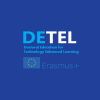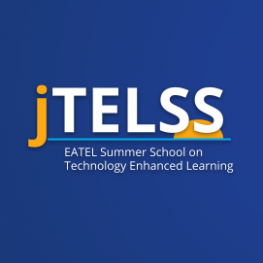Speakers
Daniele Di Mitri
German UDS, GermanyRoland Klemke
Open University of The Netherlands, The Netherlands / TH Köln, GermanyJan Schneider
DIPF, GermanyBibeg Limbu
Leiden Delft Erasmus Center for education and learningStart
24/05/2022 - 10:30
End
24/05/2022 - 12:00
Artificial Intelligence in Education, Multimodal Learning Experience and Ethics of AI (MAIED)
Tuesday 24/05 10:30-12:00h
Outdoor Area B
This session is organized by the DETEL Erasmus+ project. 
DETEL is a strategic partnership among nine European universities and EATEL to reflect their expertise in doctoral education into a new study program in TEL, extended with rich and professionally produced OERs.
Abstract
Artificial Intelligence in Education (AIED) has been a research topic for several years, which gained a recent boost due to the availability of applicable AI technology at large scale. In general, AIED deals with the question on how to use approaches and technologies of AI to better support learners with individual guidance, feedback, and tailored processes.
Basic methods represent the student’s knowledge, using techniques such as Constraint-Based Modeling, Knowledge Tracing, Computer-assisted instruction, Intelligent Tutoring Systems, or Automatic Grading Systems.
Existing systems mainly focus on content-related subjects such as mathematics, statistics and physics, enhanced with general-purpose tools like chatbots or recommender systems.
With the advent of sensor-based multimodal systems as well as augmented and virtual reality, multimodal learning experiences (MLX) become possible, where AI can also support learning and training in relation to psychomotor skills, student’s attitude, context, or emotion taking also affective and physiological aspects such as stress or concentration levels into account.
Needs Analysis
AI is a trending topic and many people think it is a new concept applied to Education. The research in this field is, however, more than 30 years old. New approaches and educational applications as well as new technological affordances in multimodal computing, however, change the application area of AIED significantly. While this on one hand delivers new opportunities, it also raises ethical issues.
Key challenges for AI in MLX comprise:
- which sensor combinations deliver meaningful data on human performance and/or affective states?
- how shall real-time data best be represented to be interpretable by AI systems?
- how can data between learners or between expert and learner be compared to detect and classify mistakes?
- how can meaningful guidance and feedback be generated on which modalities to provide the best possible learning experience?
- how can ethical aspects with respect to e.g. privacy, diversity, inclusiveness be taken into account.
Learning Objectives
We propose this workshop to be an introductory workshop of 90 minutes, that is accompanied by a mini-track of further in-depth workshops related to AI in education.
- the first part is a lecture-style presentation which introduces the rationale of AI in Education and its transformation into MLX.
- the second part is a brainstorm/group-work phase in which groups of participants work on ethical aspects of AI in education
Learning objectives: - Participants learn about various aspects of AI in Education
- The main concepts, historical and future development of AI in education are covered
- The new opportunities introduced by multimodal interfaces, sensors, advanced machine learning environments are looked into
- Ethical aspects of the use of AI in education are covered
Pre-activities
None.
Session Description
The first part of the workshop (lecture-style presentations)
Lecture style presentation about AI systems in Education (15’)
– History of AIED
– The notion of “Intelligent Tutoring System”
– Modelling the learner’s
– Knowledge representation and tracing
– Task modelling
– Instructional modelling (planning the feedback)
– Existing and most popular AI systems in Education
Practical AI applications in Education (10’)
– Chatbots and conversational agents
– Reccomender systems for study material
– Speech recognition, image classification
– Early warning systems for student at risk
Ongoing research on AI in education (short presentations of PhD projects and upcoming workshops of the AI minitrack) (20’)
– Multimodality and AI (Krist / Khaleel)
– Immersive Education and AI (Kateryna / Daniel)
– Learning Psychomotor Skills with AI & AR/VR considering Technical and Mental Aspects (Fernando / Gianluca)
– Explainable Natural Language Processing for Assessment (Sebastian Gombert)
The second part of the workshop – (Introduction to Ethics of AI, Bhoomika Agarwal)
Ethical aspects of AIED (10’)
– Privacy
– Trust and responsibility
– Fairness and inclusivity
– Explainability/transparency
Brainstorm and discussion about how to apply ethical aspects to presented applications (25’)
– Survey/discussion to collect opinions of participants about ethical aspects of AIED
– Brainstorm to apply these aspects to the presented applications
Result presentation & group discussion (10’)
Post-activities
This is the starting workshop for the AI minitrack. Interested participants are invited to deepen their knowledge in the AI minitrack.




